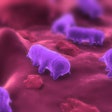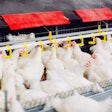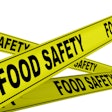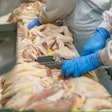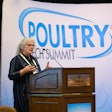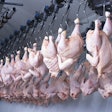
Researchers at North Carolina State University have sequenced the genome of a Salmonella Enteritidis strain that causes clinical disease in poultry.
“We are interested in what makes this Salmonella strain so virulent in broilers and how that may translate to production losses and food safety issues. If we can identity which genes are most important for virulence, this can help with developing Salmonella vaccines for poultry,” Grayson Walker, a combined DVM and Ph.D. student in Luke Borst’s laboratory at NC State’s College of Veterinary Medicine and first author of a paper describing the research, said.
The researchers sequenced the genome of the strain, which they named SE_TAU19. The sequencing revealed that the genome included seven antimicrobial resistance genes, 120 virulence genes and a large virulence plasmid. Plasmids are genetic elements that can swap between strains to make it more antibiotic resistant or infectious.
The findings of the study, published in Frontiers in Veterinary Science, could also help public health agencies better trace outbreaks and prevent future exposures.
A top-down approach to Salmonella prevention
Salmonella is gram-negative anaerobic bacterium that is responsible for approximately 1.35 million illnesses, 26,500 hospitalizations and 420 deaths in the U.S. each year, according to data from the Centers for Disease Control and Prevention (CDC). The bacteria has become increasingly multi-drug resistant, making it more difficult to treat.
Most Salmonella infections in humans are foodborne in origin, however, many animals – including chickens – can harbor the bacteria without becoming sick. Some strains, however, are virulent and can cause mortality in an infected flock.
“Salmonella Enteritidis is not only a food safety issue in poultry production, but it can also infect broilers and cause serious disease problems throughout the growing cycle,” Walker added.
“It’s important to frequently test for and eliminate Salmonella in breeder flocks, reduce egg and hatchery contamination where possible and mitigate stress during broiler production to reduce infections. Appropriate vaccination and certain feed additives can help, but it really needs to be a top-down approach with pathogens like Salmonella.”
Like what you just read? Sign up now for free to receive the Poultry Future Newsletter.








